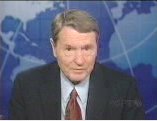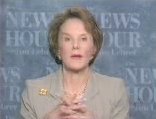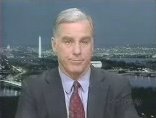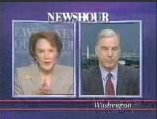

Lehrer News HourMarch 25, 2004
Jim Lehrer: Finally, tonight, a conversation with former Vermont Governor Howard Dean. Margaret Warner spoke with him this afternoon, before our interview with Secretary Rumsfeld. Margaret Warner: Governor Dean, welcome. Howard Dean, Former Presidential Candidate: Thank you for having me on. Warner: You and Senator Kerry had some fairly bitter disagreements during the campaign, particularly over the war in Iraq. Was it hard for you to endorse him today? Dean: No, actually, it wasn't hard at all. John and I met a few weeks ago. I've had a lot of contacts with his campaign folks and with him also on the phone. I think when you go through a primary campaign we focus on the differences among us. But now we're on the same team, and it's much easier to focus on the things that we have in common. We both believe in health insurance for every American, we both think that $500 billion deficits a year are killing the American economy, we're both deeply concerned about the fact that the President sent us to war without appearing not only to not tell the truth, but without appearing to listen to his advisors about the dangers of the real problem for America, which is Al-Qaeda. So, I-- no doubt in my mind that John Kerry will be a far better President than George W. Bush, in terms of national security, and in terms of our economy, and I'm happy to endorse him. Warner: During the campaign, though, you didn't just have differences on issues, but you seemed to have some criticism, really, of his political character. I mean, you said, essentially, he was part of the 'old Washington culture,' the Democrats who hadn't had the guts to stand up to George W. Bush, particularly on the war. You always had a reputation, and your supporters loved you for your straight talk. What are your supporters (??) to conclude from your decision to do this? Dean: Look, we wanted to change this country, and we wanted to change the way the Democratic Party works. I think we did change the way the Democratic Party works. I think our supporters, essentially, wrote the Democratic Party platform. But, you can't always make all the changes you want immediately. My argument to my supporters-- and most of them are going to support John, and they already have, and I was online with his supporters. Many of my folks came on, they gave him money, so-- you know, we're in the business of, and well along in the business of, trying to support John Kerry. But for those who are thinking about going for a third party, the choice is very simple. Either John Kerry or George Bush is going to be the next President of the United States. If it's George Bush, this country is in deep, deep trouble. If it's John Kerry, we've taken the first step by sending this President back to Texas permanently, toward a better America. A new America, a more optimistic and hopeful America, an America that listens to the truth. There's no question in my mind-- this is why I don't feel the least bit troubled, or ambivalent about endorsing John. Because there's no question in my mind he'd be a better President than George Bush, and therefore I have no question-- I have no hesitation in recommending him to the people who supported me during the campaign. Warner: In an online posting to some of your supporters this week, you were starting to talk about this, that, you said: "I don't want to give any of you a heart attack [Dean grins] ..." You were acknowledging that it may be hard to bring some over... Dean: It is, you know. And don't forget, what we tried to do with Dean For America, and now with the new entity, DemocracyForAmerica.com, is that we create the political culture in this country. To change fundamentally the Democratic Party, and to get people's attention out of Washington, into the rest of America, create grassroots politics. That doesn't happen in one day. We took a-- we took a lot of steps towards doing that, we've made a lot of progress, but it's not gonna happen in one day. But look, I've been a governor for a long time, and I know that when you can't get everything, you get what you can get, and then move on and get the rest of it later on. There's not any question, if you wanna change this country, the first step is changing Presidents, and John Kerry is the person who's gonna make that change. Warner: I-- Dean: -- of course, I'd much rather have it be me, but it's not gonna be me, and we've just gotta do what's right for the country, and that's supporting Kerry. 
Warner: All right, let me ask you about the story that's preoccupying-- certainly all of Washington at least-- this week, and that is the public hearings by the 9-11 Commission, the charges by the former counterterrorism chief Richard Clarke that the Bush Administration essentially didn't appreciate the urgency of the Al-Qaeda threat before 9-11. The White House is-- kinda undercut him. Do you find him believable? Does what he says ring true? Dean: It does ring true because it validates all the things I was saying in the beginning of the campaign. This Administration has engaged in a pattern of deception. Secretary Rumsfeld said on Tim Russert that he never said Iraq was an imminent threat, and Russert then played some footage that showed he had said that. The Vice President said that he-- that Iraq was about to get nuclear weapons-- there was no evidence of that. The President himself told us that Al-Qaeda and Saddam were all terrorists in this together. That was totally untrue, and the President knew very well it was untrue at the time he was saying it-- or at least he had been told by Richard Clarke that was not true, personally and to his face. 
The biggest issue in this campaign may well end up not being jobs, or the war, the biggest issue in this campaign, is 'do you believe the President of the United States? Is this a credible person?' Because when the credibility of the President disappears, that President will be replaced by the American people. Warner: So if you take Richard Clarke's two major charges-- and certainly the second one, having to do with the war in Iraq being a diversion, is something you also talked about. But take the first one, which was that the Bush Administration was somehow derelict (he didn't use that word) pre-9/11, what should the public take from that, from what he has to say? Dean: I maintained during the campaign that this President is a weak President on defense, not a strong President, because he was afraid of the facts. What Mr. Clarke testified was that he had presented the President of the United States with substantial and significant evidence that there was no link between Al-Qaeda and Saddam Hussein. The President not only refuted that, but refused to listen to any follow-up information, nor did his national security advisor, Condoleeza Rice, pass any additional information along to the President. This means we have a President of the United States, and an administration, willing to send us to war, 560 Americans, brave American soldiers killed, without wanting to know what the facts were. That is not someone who is capable of being President of the United States and exerting meaningful leadership in this country. Warner: So do you think that other members of the Bush Administration, or even the President, owe what Richard Clarke gave yesterday, which was essentially an apology to the families of the 9-11 victims? Dean: I believe that we need to commission an independent inquiry to find out what the President knew, and when he knew it. I think this calls into question the capacity of this President to serve us any longer as President of the United States, and I think it's very fortunate that an election is coming up, where the American people will have-- make their judgement. The President's credibility and honesty is now in question. Warner: Have you said, just, I think it was about a week or two ago on "Meet The Press", that you thought the number one issue would be jobs. But you now think perhaps not? Dean: Well, I-- you know, there's been a lot of talk about the President's credibility on the question of Iraq. We now have someone who's a counterterrorism expert who testified, I think credibly so, to the American people, and to various television outlets, that he presented the President with the facts, which from all our intelligence community, including having vetted it with the CIA and FBI, showed that there was no relationship between Saddam Hussein and Al-Qaeda. The President of the United States chose to willfully ignore that and send 560 Americans to die, countless thousands to be permanently injured, spending $160 billion, and more importantly, ignoring the very significant problem that we have with Al-Qaeda, which resulted in 3000 deaths in our country, 200 deaths in Spain, and many others around the world. This is a very serious problem. The President said he was gonna run as a war President. That may be his undoing. Warner: But are you saying that he bears some responsibility for 9-11? Dean: I think the responsi-- of course, in the literal way, of course not. The terrorists bombed the World Trade Center, or drove the planes into them, and killed 3000 people. That was their responsibility, and of course they should pay for that, and we have started down that road. The President, however, does bear a responsibility to defend the United States of America. And it appears the President willfully ignored information that was given to him by his administration, by a member of his administration that spent more time working for Ronald Reagan and for his father than he did for any Democratic administration. The President willfully ignored that administration (sic), and therefore this country was at risk. That is a very serious charge. I find that charge to be horrifying, but unfortunately credible. Warner: These are very tough words about the President. Are you speaking as a John Kerry surrogate, or for yourself--? Dean: --Of course not. You didn't invite me on the show to be a-- Warner: -- No, I did not-- Dean: -- surrogate, and you know, I've not been asked to appear on behalf of John Kerry. I am speaking for myself. These are the very deep concerns that I have-- I was horrified-- my-- Judy and I watched "60 Minutes," and saw Mr. Clarke's appearances; I then had watched him and heard him subsequently; I find him to be credible. I find him to be knowledgeable, and I find that the pattern of deception and denial that the Bush Administration has continued to give us to be less and less believeable. 
Warner: All right. But then, getting back to John Kerry, I mean, John Kerry also voted for this war that you said was based on deceptions and lies. How hard is it for you to go out, attack President Bush as you just have, and in the same breath, say 'vote for John Kerry'. Dean: I know John Kerry. I've come to know him. One thing about John Kerry, is that he listens to all sides before he makes a decision. Yes, we had stern and strong disagreements about the vote on the war. But the fact is that I believe John Kerry, when he says that he got all the information he could before he made that decision. It is evident that the President did not get all the information that he had access to before he made the decision to ignore-- or to, excuse me, to minimize the Al-Qaeda threat, and then to deliberately go to war with Iraq when they, perhaps the right choice would have been to go to an extended action against Al-Qaeda, which we're now undertaking, many months after we could have. So, I don't think there's any comparison between John Kerry voting for the resolution after getting as much information as he could on hand, and the President of the United States ignoring information deliberately, from the national security counterterrorism advisor, which had been vetted by the CIA and the FBI. This is a very, very serious charge. I think there needs to be testimony under oath by many people to find out just what happened. 560 people have lost their lives as a result of this decision. 3000 Americans lost their lives. We have a right to know if the President protected us to the best of his ability. Warner: Finally, you have created this new grassroots organization, it's called Democracy For America, that you've said was devoted to, kind of, [makes a stair-stepping gesture with her hands] elect progressives up and down the ballot. How does this either complement or conflict with whatever you're going to do for the Kerry campaign? Dean: I think it'll help a lot. There are, as you pointed out in the beginning of this show, there are people who are nervous about supporting John-- they supported us, and now, hopefully they're all going to vote for John Kerry. But they want to put their energy in other places right now. So a lot of our people will support Kerry actively, but a lot of them are, you know, they're saying, 'well, gee, we're really interested in the grassroots.' Well, now they have a place to go. We want them to run for office. We already have 200 people from our organization running for school boards and county officials and state legislators. We wanna train them. We wanna support the ability of Congress to be taken back by the Democrats, we wanna support the ability of the Senate to do that. So there are a lot of things that I can do through this new organization, 'DemocracyForAmerica.com', that I couldn't do as a candidate for President, and that I think will be in addition to my personal work on behalf of Senator Kerry. Warner: Now this work that you're going to do in Democracy For America will of course cost money. I assume you're going to tap the base of, what, 500,000 Internet donors. Will those donors also be available to John Kerry, are you also contacting them and urging them to give? Dean: We have not done that but we will do that. We will do that probably within the next couple of weeks. We have done some direct mail for John, and we will do-- we will use our list to try to raise money for John Kerry. Warner: All right, Governor Dean, thank you so much for being with us. Dean: Thank you very much.
Video. |

.
.
 |
